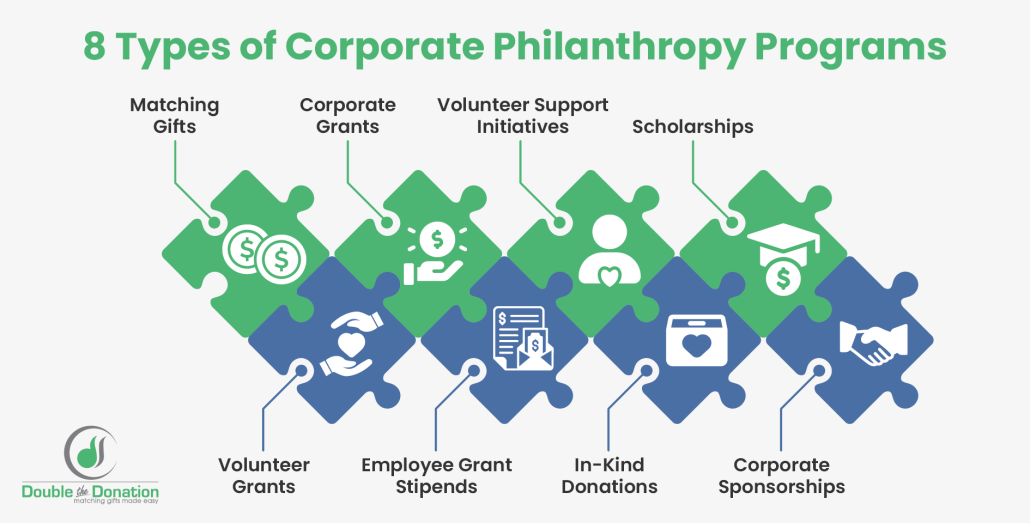Corporate philanthropy success stories: How giants like Coca-Cola give back
The Duty of Corporate Philanthropy in Fostering Sustainable Organization Practices
Company philanthropy has become a crucial strategy for organizations aiming to incorporate sustainability right into their procedures. By lining up corporate goals with social and ecological campaigns, companies can promote much healthier ecosystems. This approach not only enhances business credibility but also reinforces stakeholder partnerships. Nonetheless, the real degree of its influence on lasting service success remains to be checked out. What ingenious methods are being embraced therefore?
Comprehending Corporate Philanthropy and Its Significance
Corporate philanthropy offers as an important mechanism where businesses can add to societal well-being while enhancing their own credibilities. This technique involves organizations assigning resources, such as funds, time, or knowledge, to support area initiatives, philanthropic causes, or social programs. By engaging in kind initiatives, firms can attend to pressing social concerns, such as education, health care, and environmental problems, thus playing a pivotal duty in fostering favorable adjustment.
Business philanthropy can boost staff member spirits and attract skill, as individuals progressively look for to function for socially responsible organizations. It can additionally enhance client commitment, as customers choose brand names that show a commitment to making a distinction. Inevitably, understanding the value of business philanthropy depends on recognizing its double advantages: enhancing area welfare while at the same time improving organization integrity and trustworthiness in the eyes of stakeholders. This positioning of social duty with industrial passions emphasizes its relevance in today's company landscape.
The Link Between Company Philanthropy and Sustainability
While several firms take part in philanthropy to enhance their public picture, a deeper link exists in between company philanthropy and sustainability. Company philanthropy frequently straightens with sustainable techniques by supporting efforts that deal with ecological and social challenges. They contribute to a much healthier ecological community and society when companies invest in community tasks, sustainable power, or academic programs. This commitment not just fosters a good reputation yet additionally enhances stakeholder relationships, boosting brand loyalty.

Situation Studies: Successful Company Philanthropy Initiatives
Numerous business have efficiently integrated kind efforts right into their company approaches, showing the concrete advantages of such commitments. Microsoft has actually introduced various programs, such as its AI for Planet effort, which sustains environmental sustainability with technology. This strategy not only aids conservation efforts yet likewise boosts Microsoft's online reputation as a leader in corporate duty.
In a similar way, Unilever's Lasting Living Plan stresses social and ecological influence, straightening its philanthropy with service goals. By funding jobs that boost hygiene and hygiene, Unilever reinforces its brand while contributing to worldwide health and wellness.
An additional noteworthy instance is Patagonia, which promises 1% of sales to ecological causes. This dedication reverberates with customers, fostering loyalty and driving sales.
These situation research studies highlight that reliable business philanthropy can generate economic returns while promoting sustainable methods, strengthening the concept that honest service practices are useful for both culture and bottom lines.
Structure Stronger Stakeholder Relationships With Philanthropy
Philanthropy functions as an essential tool for companies seeking to strengthen their relationships with stakeholders, as it cultivates depend on and demonstrates a dedication to social duty. By participating in charitable efforts, organizations can get in touch with regional areas, boosting their reputation and encouraging stakeholder loyalty. This interaction commonly leads to significant communications, producing a sense of shared values between the firm and its stakeholders.
Philanthropic initiatives can address certain area demands, enabling organizations to add favorably to societal difficulties. This involvement not just showcases a firm's ethical position but likewise aids in bring in and preserving consumers who prioritize social duty.
Additionally, workers often really feel more determined and engaged when they see their organization proactively joining kind activities, resulting in an extra productive workplace society. Subsequently, company philanthropy comes to be a tactical avenue for building stronger, a lot more resistant partnerships with diverse stakeholder teams.
Determining the Effect of Company Philanthropy on Service Success
The link between business philanthropy and stakeholder interaction establishes the stage for assessing its influence on general organization success. Organizations frequently measure this impact via numerous metrics, including brand online reputation, employee satisfaction, and consumer loyalty. Philanthropic initiatives can enhance a firm's image, cultivating trust among customers and investors alike. Engaged employees often tend to display higher spirits and efficiency, directly correlating to improved company efficiency.
Measurable evaluation can also be used, with organizations evaluating financial returns against humanitarian expenditures. Research shows that business with solid philanthropic commitments frequently experience greater stock efficiency and minimized volatility. Additionally, qualitative assessments, such as stakeholder comments, can provide insights right into area assumptions and long-lasting relational advantages.
Eventually, determining the effect of company philanthropy calls for a diverse strategy, integrating both qualitative and measurable information to ensure a comprehensive understanding of its impact on business success. corporate philanthropy.
Frequently Asked Inquiries
Just How Can Little Companies Participate In Corporate Philanthropy Efficiently?

What Are Usual Misconceptions Regarding Business Philanthropy?

Exactly How Does Business Philanthropy Influence Employee Spirits?
Company philanthropy favorably influences staff member spirits by fostering a feeling of function, enhancing job fulfillment, and pop over to these guys promoting loyalty. Workers commonly feel more engaged and encouraged when their company adds to social reasons, developing a supportive workplace.
What Are the Tax Benefits of Corporate Philanthropy for Companies?
Company philanthropy provides significant tax benefits for companies, including reductions on charitable contributions and possible reductions in gross income. These incentives urge companies to participate in social campaigns while at the same time enhancing their financial standing.
Just How Can Companies Pick Reliable Philanthropic Partners?
Companies can choose efficient humanitarian partners by assessing placement with their values, gauging impact potential, taking a look at financial transparency, and fostering strong interaction. This critical technique enhances collaboration and guarantees mutual advantages for both events included.
Corporate philanthropy offers as an important system through which organizations can contribute to societal health while improving their own track records - corporate philanthropy. Eventually, comprehending the importance of corporate philanthropy read review lies in acknowledging its twin advantages: enhancing community well-being while at the same time boosting service credibility and reliability in the eyes of stakeholders. While lots of business engage in philanthropy to improve their public photo, a much deeper connection exists between company philanthropy and sustainability. The link in between business philanthropy and stakeholder engagement sets the phase for assessing its influence on total company success. Business philanthropy supplies considerable tax obligation advantages for companies, consisting of reductions on charitable contributions and potential decreases in taxable income